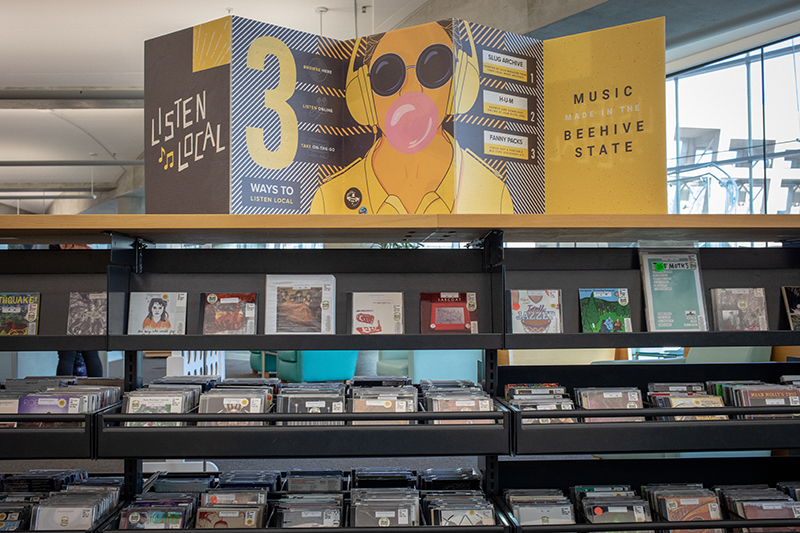
Gathering Music: The Library’s Process of Preserving Local Histories
Art
A brief trip from the parking garage, and I’m standing in the main entrance of the SLC Downtown Library. The fourth floor houses nonfiction and music, the reason I’m here. I’m meeting Jason Rabb, the Library Representative spearheading the massive initiative of compiling, organizing and preserving the entire SLUG archive of local music albums. The SLUG local music archive, along with the Downtown library’s own collection of local music, is now available to the public via the Main Library.
Rabb has spent five years bringing this project to fruition. He sees me wandering from the information desk and waves his hand wildly—I like him already. We exchange pleasantries, and he asks me to follow him for a sec. As were chatting about Rabb’s band in the archive and winding through the library, I get the impression that Rabb is both exuberant and understanding at the same time. An accomplished musician in his own right and the library’s representative for music and non fiction, Rabb is the ideal person to take on this task. He gestures at a passing aisle and grabs a stack of music. “I wanted to show you these examples … ” Rabb says. The stack leans in no discernible way and has fur, silk and mini-discs spilling out on all sides. “Local musicians get real creative with their albums, some of these even came with stickers,” Rabb says and carefully sets the stack down in an empty conference room and shuffles through a few albums. “This is history, little moments … I didn’t want that to go away.”
The SLUG archive goes back to the late ’80s and started gaining considerable volume in the mid-2000s. SLUG Executive Editor Angela H. Brown comments on how it came to be: “I felt the need to form a local archive even though I didn’t have an exact plan for it,” Brown says. “The promos we’d receive were so heartfelt. Handmade cases, handwritten liner notes, silk-screened special editions—local musicians were pouring their creativity into press packages for SLUG to review. As the local archive amassed, office visitors would ogle at the collection. It became apparent that it was time for the public to have access to it.”
Rabb and I leave the conference room, and I finally get to see the library’s local-music collection. The collection of reviewed music with the library’s existing collection spans a variety of genres. Tapping my finger across the tops of various CDs, it feels like the pages of a juke box mixed by the Salt Lake City itself. The cataloguing of the collection was specific and easy to follow. This public offering gains significance when you consider that it’s the only thing of its kind. I ask Rabb if there was a model he followed or any library that had done this before, and he smiled and says, “Yeah, no. We’re the first to partner like this and create a collection for the public to check out.” Aside from Rabb, volunteers and library and SLUG staff have contributed to the project. The weight and effort of this undertaking sits squarely on Rabb’s face—he says, “It’s nice to have this incredible collection out and available to everyone.”
We continue our tour behind the scenes to lower portions of the library. Among the festive desks and piles of books sits a cart filled with more local music. “These are albums that still needs to be catalogued,” Rabb says. The SLUG Archive and Downtown Library collaboration is a “living project” and grows with each music review and library purchase. “This was a SLUG/Library collaboration … It wouldn’t have happened any other way,” says Rabb. One element I find particularly unique is the amount of music the library purchased from local record stores. Another encouraging detail I noticed earlier was the wear and tear on the albums themselves. Rabb confirms that these albums are being used and checked out. Given their unique and one-of-a-kind nature, I almost worry about them. “Several of these albums the musicians don’t even have,” says Rabb looking down at the collection, “such odd and wonderful little moments.”
We finish our conversation talking about HUM hum.slcpl.org, the Salt Lake City Library’s online music-streaming service. HUM, an acronym for Hear Utah Music, has a variety of local music that has been selected by a community jury (featuring SLUG’s own Editor Alexander Ortega last year). The site, also features a unique posters section that captures unique tidbits from concerts past. In my time with the site I was surprised at the depth and volume of music being made now and nearby. Taking in the breath of creativity in this city is daunting. In this, I understand a little of what it was like five years ago when Rabb started sorting through local CDs.
If you would like your music made available to the public through the library, you can have it reviewed by SLUG Magazine by emailing reviews@slugmag.com. If your music is available in a record store the library can also purchase it through them. –Benjamin Tilton